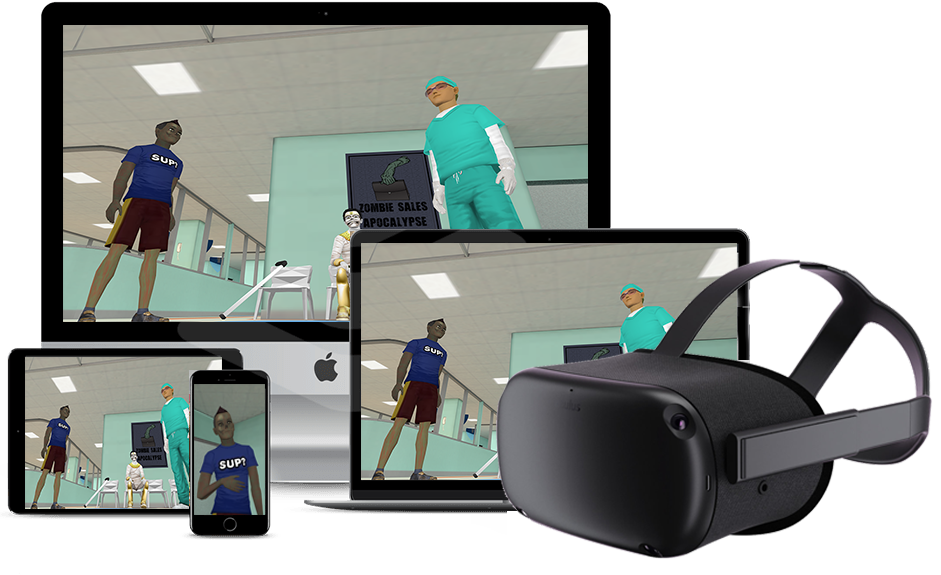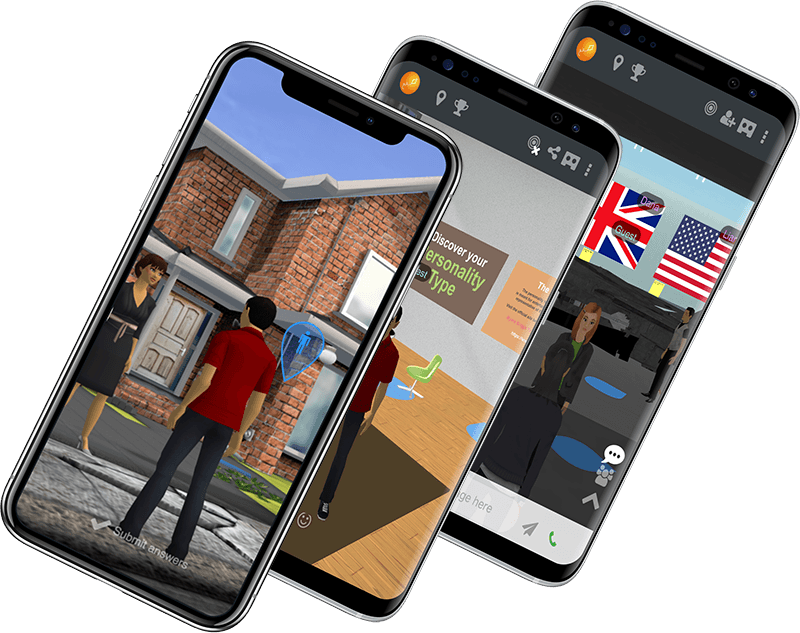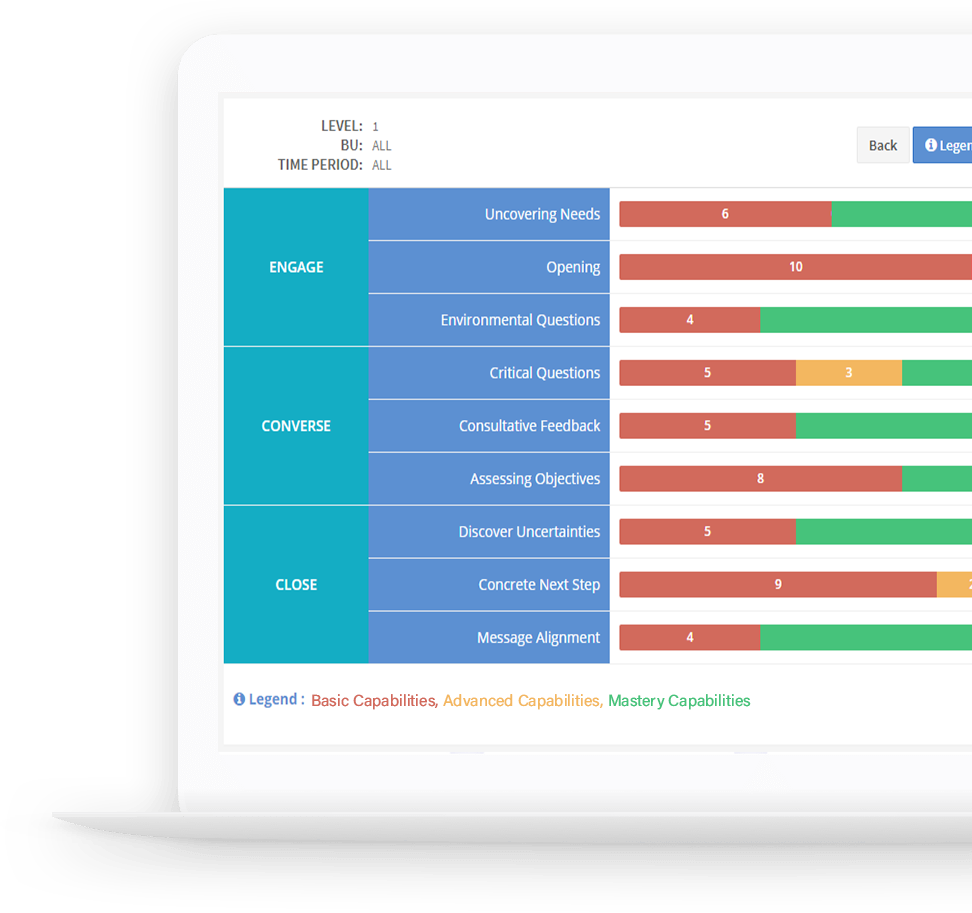Game Based Training for Enterprise
Zombie Sales Apocalypse!
Play the demo if you dare!
A flexible, interactive sales training tool that immerses the learner in an environment focused on building sales skills. The sales training tool is built from the ground up on a foundation of solid academic research.

Gameplay Experience
Here is a quick synopsis of the zombie version of the game. Other versions are available.
A powerful virus has been striking people throughout the city turning infected individuals into zombies. The learner (sales rep) must carefully “sell” the antidote using his or her organization’s trusted sales model.
The learner will have to use all of their wits, wisdom and experience to convince the person they are speaking with to buy what they are selling—not unlike a sales person’s day job.
WebXR cross-platform delivery allows the experience to occur on any browser or device from mobile phones to the latest VR/AR headsets. This means no Apps to install and instant delivery, even from your own LMS.
Powerful Sales Training Platform
Powerful Analytics
What sets this sales training platform apart is the ability to track every behavior and conversational choice made by the sales representative. In the set up phase, your organization’s individual sales model is a map to conversational elements. As a result each choice made by the learner with the sales conversation is tracked.
What this means is that at the end of the game, you can see how each sales representative responded and behaved in terms of your own individual module. Did the sales rep make the most optimal choices or were sub-optimal choices made?
Fully Customizable
The game comes “out of the box” 80% complete which avoids the cost of developing the game from the ground up. Your organization along with our experienced team completes the game to your exact needs using your sales model and your sales conversation.
This means there is a template and general functionality, like questioning, player analytics and gameplay standard in any version of the game. The 80% complete concept reduces your costs and provides you with an immersive learning game quickly and inexpensively.
Learning Elements
The interactive learning experience uses evidence-based best practices as they relate to game-based learning. Research has shown that games are effective for learning because they actively engage learners in the course material as opposed to passively conveying it during a lecture, an assigned reading or a watching a video. Research strongly suggests, the more active and engaged the learner, the more effective the learning.
When a learner makes a decision in the game, he or she receives immediate feedback either reinforcing or correcting the decision and behavior.
Why Fantasy-Based?
Why zombies or robots? Why include a fantasy element and not just a serious branching-simulation with no gameplay? The use of fantasy is a purposeful design decision having a direct positive impact on learning. In fact, research indicates that fantasy provides cognitive emotional and motivational advantages for learning.
Feedback is conveyed in a safe environment with specific, but not catastrophic, consequences for failure. The fantasy of dealing with the zombies means that failure and experimentation are allowed and encouraged. Humans learn from failure more than instant success.
The fantasy environment allows for failure and re-engagement with the content again and again which leads to mastery.
Evidence-Based Approach
The result of this evidence-based approach is a tool that motivates and engages the learner while simultaneously meeting the desired behavioral and performance goals of the organization. Research indicates that the engaging elements of games make them effective tools for learning, and when properly designed and incorporated into a curriculum provide improvements in learner performance.

Fully Customizable
Zombie Sales Apocalypse™ is built upon a flexible game engine and environment. This means zombies are not the only foes that are possible. If you hate zombies (and who doesn’t). Well we mean, if you think they are not corporate or serious enough for your organization, we can create “competitors” who the player races against to make the sale. Same tension and same suspenseful and engaging gameplay…only a different foe.
Your organization can “swap out” an environment filled with zombies for an environment filled with robots or aliens or some other creature such as a rival competitor or a mock competitor–virtually anything is possible. It is also possible to swap out environments, if an office environment is not appropriate; perhaps a lab environment or a retail environment is more appropriate. Those options are available within the game with minimum costs because the underlying game engine does not change, only the “skin” or appearance of the game changes, keeping the cost low.
Zombie Sales Apocalypse™ is built so that if zombies or robots are not a good fit for your organization, you can tailor the environment to be more of a simulation and not have any fantasy characters.
Powerful Analytics
Zombie Sales Apocalypse™ tracks the sales representative’s responses to each interaction with any non-player character in the game and any action the player takes in the game. These non-player characters can represent customers, potential customers or even serve as distractors. Your sales model is mapped to the game.
The sales reps actions and responses to non-player characters are presented in a dashboard for viewing by the player and by a regional or district sales manager in aggregated form across all sales representatives as selected by a program administrator who is most often a manager. This allows managers to gain a high level view of the performance of their sales team within the simulated selling environment. It also allows you to track behavioral responses over time.
A sales strategy and call objectives are written by the sales representatives at the beginning of the game. The written strategy and call objectives are compared to the decisions the learners made during the game. This allows managers as well as learners to evaluate how they prepared for the call and their intended outcome of the call with the actual activities and events they conducted during the call.

Learning Elements
Zombie Sales Apocalypse™ uses evidence-based best practices as they relate to game-based learning. Research has shown that games are effective for learning because they actively engage learners in the course material as opposed to passively conveying it during a lecture, assigned readings or a watching a video (Sitzmann, 2011; Wouter et al, 2013).
When a learner makes a decision in a game, he or she receives immediate feedback either reinforcing or correcting the decision. Zombie Sales Apocalypse™ consists of three parts designed to increase learning. First is a pre-call process where the learner indicates a strategy for the call and determines collateral to bring on the sales call. This uses a process called Advanced Organizer which focuses the learners attention on what he or she is about to learn. It stimulates thinking about the subject matter.

After the sales representative completes the section asking them to relate a specific sales strategy to an element of the sales model, the sales representative then begins playing the game where he or she must execute a successful sales call.
During the call, the learner encounters a series of sales conversations with different individuals. These individuals include a receptionist, a nurse and a physician but can vary depending on the sales process of the organization. The learner interacts with these characters reinforcing and practicing the skills associated with the organization’s sales model and process.
Each interaction leads to a branching scenario, some branches will be correct and others incorrect. Feedback guides learners to appropriate learning outcomes and reinforces the desired sales behaviors.
The focus on quick decision making and immediate consequences for incorrect answers provides authentic cognitive practice for the skills you want your sales representatives to possess. Each decision is scored against the sales model. At the end of every level, learner performance is compared to the ideal sales process.
The third learning element comes into play when the learner reflects on the experience and how they executed against the sales model. This helps the learner to focus on the experience and highlight what he or she did well and identify areas for improvement. This is accomplished through a series of summary questions.
Reflecting upon a learning experience is a highly effective methodology for achieving the desired results using game/simulation-based learning tools.
Why Fantasy-Based?
Why zombies or robots? Why include a fantasy element and not just a serious branching-simulation with no gameplay? The use of fantasy is a purposeful design decision having a direct positive impact on learning. In fact, research indicates that fantasy provides cognitive emotional and motivational advantages for learning (Malone, 1981).
In terms of the cognitive benefits, the issues confronted and successfully resolved in the fantasy world provide the learner with natural constructive feedback in an uninhibited interaction. The learner is often more open to receiving feedback in a fantasy world because it is unfamiliar and they need feedback to understand the new environment. (Lepper, 1988)
Feedback is conveyed in a safe environment with specific, but not catastrophic, consequences for failure. The fantasy of dealing with the zombies means that failure and experimentation are allowed and encouraged. Humans learn from failure more than instant success. The fantasy environment allows for failure and re-engagement with the content again and again which leads to mastery.
We also know that if a simulation provides the same cognitive activities as the real-life situation, the skills are transferable to the actual in-the-field situation. In the Zombie game, the sales model is the exact model used in the field. The different environment actually helps with generalizing of the knowledge and creates, in the mind of the learner, a set of heuristics to deal with sales situation rather than creating a rigid set of algorithms that are difficult to generalize.
In terms of emotional impact, fantasy provokes vivid images related to the material being learned, thus improving the learner’s memory of the material. Emotionally, fantasy also helps to break down the defenses of a learner. When confronted with many sales situations, the learner may feel he or she is already well versed in their subject viewing the training process as a waste of time. Fantasy helps to break down that resistance because the environment is new, novel and different. The learner doesn’t know how to deal with zombies or the new environment; it makes them more open to exploring the learning environment and less defensive (Lepper, 1988; Malone, 1981).
Deena Skolnick Weisberg, a senior fellow in the department of psychology at the University of Pennsylvania, performed a study involving teaching children vocabulary words. In her study, she found that children gained more knowledge from fantastical stories than from the realistic stories. The problem with this finding is that it seems a little contrary to what people think about learning and transfer. Most of the thinking is that the more similar the learning context is to the context where the information is eventually going to be applied, the better. However, Weisberg’s study indicated that fantasy allowed children to learn more.
This is not really surprising given the work of Malone and Lepper but it does seem to fly in the face of conventional wisdom which is to make learning as realistic as possible. But perhaps fantasy of children, and adults, plays a more powerful learning role than we know. One that helps us transition from unknown to known.
It might be that:
… something about fantastical contexts…is particularly helpful for learning. From this perspective, fantastical fiction might do something more than hold children’s interest better than realistic fiction. Rather, immersion in a scenario where they need to think about impossible events might engage… deeper processing, precisely because they can’t treat these scenarios as they would every other scenario that they encounter in reality.
[Weisberg]
Cognitively, the learners have to work harder to learn the information because there are few familiar contexts. Fantasy can provide the right environment and cognitive triggers to cause adults to think more deeply and richly about subject matter because it is foreign and requires more processing.
Finally, games can be highly motivational. While not everyone loves to play games, a large portion of most populations like to play games and enjoy the opportunity to gain mastery of the game environment. Games provide an immersive learning environment because they require continual vigilance, provide constant feedback, correct incorrect activities and reinforce correct performance which eventually leads to mastery of content.
Let’s Get Started
Find out more about Fun, Engaging and Impactful Learning Experiences
References:
Sitzmann, T. (2011). A meta-analytic examination of the instructional effectiveness of computer-based simulation games. Personnel Psychology, 64(2), 489–528.
Wouters, P., van Nimwegen, C., van Oostendorp, H., & van der Spek, E. D. (2013). A meta-analysis of the cognitive and motivational effects of serious games. Journal of Educational Psychology, 105(2), 249–265.
Stefano, G. D., Gino, F., Pisano, G. & Staats, B. (2014) Learning by Thinking: How Reflection Aids Performance, Harvard Business School, Working Paper. 14-093.
Lepper, M. R. (1988) Motivational considerations in the study of instruction. Cognition and Instruction. 5(4), 289-309.
Malone, T. (1981) Toward a theory of intrinsically motivating instruction. Cognitive Science, 4. pp. 333-369.
Weisberg, D. S., Ilgazb, H., Hirsh-Pasekc, K., Golinkoffd, R., Nicolopouloue, A., Dickinsonf, D. K., 2015) Shovels and swords: How realistic and fantastical themes affect children’s word learning. Cognitive Development. Volume 35, July–September 2015, Pages 1–14.